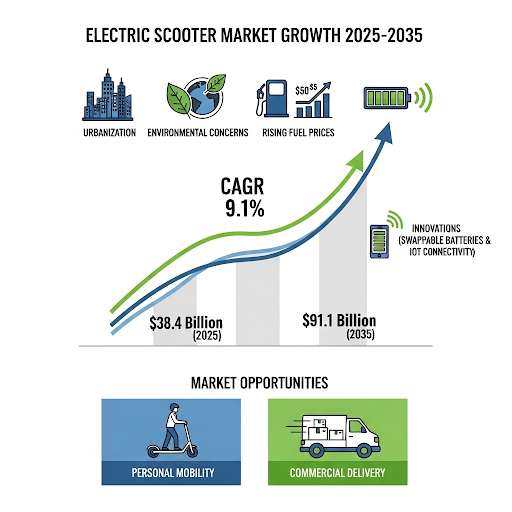The global electric scooter market is revving up for a transformative decade. Forecasts indicate that the sector will grow from USD 38.4 billion in 2025 to USD 91.1 billion by 2035, achieving a robust CAGR of 9.1%. Driven by urbanization, environmental concerns, rising fuel prices, and the evolution of micro-mobility ecosystems, electric scooters are fast becoming the preferred choice for short-distance commuting, last-mile connectivity, and eco-friendly urban transport.
Technological Advancements: Making E-Scooters Smarter
The electric scooter market is being fueled by continuous technological innovation. Modern scooters now feature swappable batteries, regenerative braking, IoT connectivity, and mobile app integration. Battery technology, in particular, is improving rapidly, with lithium-ion batteries offering longer range, reduced weight, and longer lifespans. Future models are expected to adopt solid-state batteries, AI-powered safety features, and full integration with smart city infrastructures.
Lightweight materials such as carbon fiber, magnesium alloys, and smart polymers are enhancing the durability and energy efficiency of scooters. Modular designs simplify maintenance and upgrades, making scooters more user-friendly and sustainable in the long term.
Regional Insights
North America: The region is witnessing steady growth in electric scooter adoption, particularly in the United States, driven by urban micro-mobility initiatives and shared e-scooter programs. Cities like Austin, Washington D.C., and Los Angeles are pioneering large-scale scooter-sharing schemes, while private buyers are increasingly investing in compact personal scooters. The integration with urban mobility apps, battery advancements, and safety features are key drivers.
Europe: Europe’s electric scooter market is highly developed, led by countries like Germany, France, and Italy. Governments are actively promoting green transport through subsidies, exclusive scooter lanes, and regulations to manage safety and parking. Compact, lightweight scooters are especially popular in densely populated urban areas. The rise of shared e-scooter platforms aligns with cultural shifts toward sustainable micro-mobility solutions.
Asia-Pacific: Asia-Pacific dominates production and sales of electric scooters, with China and India leading the charge. High population density, cost-conscious consumers, and local manufacturing capabilities have driven mass adoption. India’s FAME II scheme provides incentives for e-scooter buyers, while Southeast Asian countries like Indonesia, Vietnam, and Thailand are increasingly embracing electric scooters for urban commuting. Japan and South Korea are investing in premium models featuring advanced technologies for both personal and commercial use.
Market Challenges
Despite impressive growth, the electric scooter market faces some challenges:
- Charging Infrastructure: Many developing regions lack sufficient charging stations, limiting adoption. Users remain concerned about battery range and maintenance. Expanding charging networks and standardizing battery systems will be crucial for continued growth.
- Urban Regulation and Safety: Rapid growth has prompted regulatory concerns over road safety, helmet use, and sidewalk riding. In some areas, shared scooter bans or restrictions have been imposed. Streamlined legislation, rider education, and infrastructure planning will help mitigate these risks.
Market Opportunities
- Sharing Economy and MaaS Integration: Electric scooters are central to Mobility-as-a-Service (MaaS) platforms, allowing users to combine multiple transport options in a single app. Shared scooter fleets are ideal for urban short trips, reducing private car dependency. Data from these platforms can guide city planning and policy decisions.
- Innovations in Design: Lightweight materials, modular designs, and swappable batteries are enhancing convenience, reducing downtime, and boosting user adoption. These innovations make scooters more suitable for dense urban environments and developing countries.
Segment Analysis
By Product Type:
- Retro Electric Scooters: Combining classic design with modern technology, retro scooters appeal to style-conscious riders in Europe and Asia. They feature lithium-ion batteries, regenerative braking, and IoT connectivity. Although pricier, retro models are popular among millennials and Gen Z seeking both aesthetics and performance.
- Standing/Kick Scooters: Compact, portable, and affordable, these scooters dominate urban personal transport. Folding designs, app-controlled locks, and swappable batteries make them ideal for short-distance commuting and shared mobility platforms.
By Application:
- Personal Mobility: Urban commuters are increasingly relying on e-scooters for convenience, cost-effectiveness, and environmental benefits. Features such as GPS tracking, app control, and foldable designs make them ideal for everyday use.
- Commercial & Delivery: E-scooters are revolutionizing urban logistics for food delivery, postal services, and last-mile goods transport. Enhanced storage, robust frames, and tracking systems are being adopted, particularly in India, China, and Indonesia. Governments are supporting commercial fleets with subsidies and tax incentives.
Competitive Landscape
Key players are innovating across product design, battery technology, and digital integration:
- Yadea Group Holdings Ltd.: Offers a wide range of scooters with lithium batteries, anti-theft features, and energy-efficient motors, with strong R&D focus and global expansion.
- Niu Technologies: Known for app-connected scooters with GPS, IoT, and OTA updates, appealing to tech-savvy urban riders.
- Hero Electric: Focuses on affordable, low-maintenance scooters for India’s urban and rural markets, supported by local manufacturing and government incentives.
- Ather Energy: Premium Indian brand offering high-performance scooters with touchscreen dashboards, fast charging, and in-house charging networks.
- Ola Electric Mobility Pvt. Ltd.: Offers AI-enabled scooters with integrated manufacturing, direct-to-consumer sales, and large-scale production capabilities.
Other notable players include Gogoro Inc., TVS Motor Company, Segway-Ninebot, Bajaj Auto Ltd., and Simple Energy.
Future Outlook: 2025–2035
The electric scooter market is entering a phase of sustained growth and technological sophistication. Key trends shaping the next decade include:
- Integration with smart city initiatives and urban mobility platforms
- Widespread adoption of solid-state batteries and AI-enabled safety features
- Growth of subscription-based ownership and utility scooters for cargo
- Expansion of commercial fleets and shared micro-mobility solutions
- Increasing focus on sustainability, including battery lifecycle management and modular components
Related Market Data: https://www.futuremarketinsights.com/reports/electric-scooters-market
